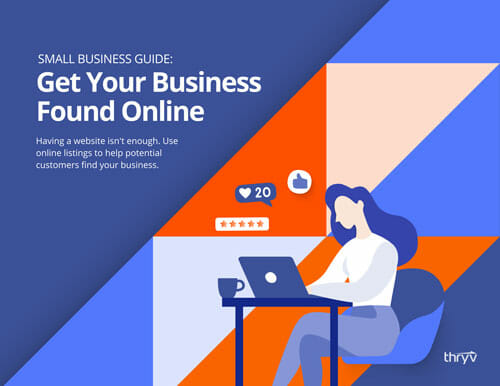If you want to be found online, local search is the best way for small businesses owners.
Small businesses use local search features to rank higher on search engines like Google and to generate more engagement for their businesses. They utilize resources like online listings, customer reviews, and digital advertising to attract customers who are shopping in their area. The stronger you are in these online disciplines, the easier it is for customers to find you.
In this post, we’ll explain everything you need to know about local search, including how to dominate it as a small business owner. We’ll also provide a list of local search tools you can use to craft marketing campaigns and rank higher on search engines.

Free Online Listings Guide for Small Business
DownloadWhat is Local Search?
Local search refers to search engine results that display information about businesses in your area. For example, if you Google “dog groomers near me,” that would be a local search, and the businesses shown would be local search results.
Most search engines provide a series of local listings alongside a map that shows where each business is located. Here’s what a local search results page might look like on Google:

Why is Local Search Important for Small Businesses?
If you want to build your online presence, local search is a key component for increasing brand awareness. In other words, Google is one of the easiest ways to find a business online. And the easier it is for Google to find you, the more likely it is to feature your business in its search results.
If you don’t think that will make a difference on your bottom line, here are some local search stats to keep in mind:
- 46% of all Google searches have local intent – Nearly half of the things people search for on Google are products and services in their area.
- 28% of local searches end with a purchase – About 1 in 4 people who search for a business in an area will buy from that business.
- 81% of consumers use Google to find reviews – If Google doesn’t have information about your business, you’re missing out on the primary channel people use to find customer reviews.
- 64% of small businesses have an online presence – Not only are most businesses moving online, but there’s still a huge opportunity to get ahead of competitors who haven’t.
Ready to top the competition on Google? Let’s review a few ways to dominate local search at your small business.

Get Your Business
Found Online
Are you ready to get serious about your online listings?
How to Dominate Local Search
Remember: Search engine optimization (SEO) is a long-term play. While these strategies won’t change your company overnight, they will generate more contacts for your business. Keep up with them over time, and you’ll grow your online presence and drive more traffic to your phone and website.
1. Update your Google Business profile.
Google is the most popular search engine by far — it controls over 90% of the market share for search engines. If you don’t have a Google Business profile or haven’t updated yours in a while, you’re missing a golden opportunity to advertise on the most active channel on the Internet.
If you haven’t claimed your business profile, here’s a post to walk you through the process. Even if you’ve already created one, it’s good practice to revisit it constantly and ensure it’s up to date. The last thing you want is inaccurate information to confuse or deter potential customers from doing business with you.
2. Ask for online reviews.
Not only are reviews great for word-of-mouth marketing, but they also play a major role in local search rankings. In fact, online reviews are one of the most important factors that affect where your business ranks on Google. Google will rank companies with lots of positive reviews higher than businesses that have negative or no reviews at all.
You can gather online reviews simply by asking customers. 80% of online reviews are generated from follow-up emails. The next time you have a great experience with a customer, send them an email with a link to your Google profile so they can leave a glowing review for your business.
3. Organize your website.
Site structure is another factor that affects search rankings.
What is site structure? It’s the internal infrastructure of your website that Google sees when it crawls your web pages.
To avoid going down a technical rabbit hole, here’s what you need to know about site structure and organization.
- Create a home page and navigation menu that links to your website’s pages — like how the menu at the top of this page links to “Products,” “Pricing,” “Industries,” and “Resources.”
- Add links to other relevant pages on your website. Search engines analyze these links to determine the intent and authority of your web pages.
- If your website provider offers them, use “categories” and/or “tags” to group relevant content together. This is called website taxonomy.
- Your website should be easy to navigate and have unique pages for each topic. Avoid creating duplicate pages that target similar topics, as this will confuse readers and search engines.
- Update or remove outdated content. Not only will this create a better user experience, but it will also show search engines that your content is fresh and up to date.
4. Review your business listings.
Google isn’t the only place people can find your business. Listing websites like Yelp and social media are additional channels you’ll want to manage, especially regarding comments and reviews. If you don’t respond to negative reviews, you can quickly build up a poor reputation.
Pro Tip: Local listing software can help you manage your online listings in one place.
5. Use paid advertisements.
Have you ever noticed the “sponsored” links near the top of a Google page?

Or, maybe an ad on the sidebar of YouTube:

These are two examples of ads that businesses can pay for online. They appear based on what a user is searching for or searched for previously. Businesses will bid against other businesses to have their ads placed at the top of search results for specific keywords or phrases. This is called paid search, and it can be very effective for small businesses.
Nearly half of the clicks on a search results page go to the top three paid search ads – making this valuable real estate for your business to occupy, if you have the budget to do so. If you advertise on pages related to your business (or your competitors), you’ll increase traffic to your website and improve your overall search rankings.
For example, here is an ad campaign that I ran for my website:

Pro Tip: A campaign management tool ensures your ads reach the right audiences on the right channels.
6. Target the localized keywords.
Sticking with our keyword theme – localized keywords are search phrases with a location intent. For example, I could search for “dog groomers near me,” or “dog groomers in Texas.”

The second keyword is more specific. It tells Google to narrow its results to a specific location, regardless of where I am. As a small business, you can rank for this keyword because it’s static and relatable to your business if you’re a dog groomer operating in Texas.
The other advantage is that these keywords have a very high conversion rate. If someone is searching for a business nearby, they’re probably ready to buy or are close to a buying decision. For these keywords, it may be worth spending your money on advertising because you’re more likely to see a return on your investment.
7. Create content.
Content is the final piece of the puzzle for dominating local search. Online listings make you more accessible, reviews make you trustworthy, and ads help you convert traffic. But, content makes your business organically rank higher on search engines – which is incredibly cost-effective for small businesses.
When I say organic, in this case, I mean that someone discovers your business simply by Googling something. They might find a blog post or a video you created on the topic. Search engines will also display social media posts related to a keyword, so your social content also plays an important role in improving organic search results.
If you’re not sure where to get started with content creation, here are a few things you could try:
- Post regularly on social media
- Create how-to videos
- Write blog posts
- Start a podcast
- Host online webinars and Q&As
- Participate in community forums
If you don’t have time to do all of this, no worries. Start where you can, and keep in mind that you don’t have to do everything at once.
Now let’s look at a few tools you should consider for managing local search.
3 Local Search Tools for Small Businesses
Here are three tools that small business owners can use to improve local search rankings.
1. Google Ads
Best for: Paid Search Campaigns

If you want to advertise online, Google Ads is a great place to start. Not only is it connected to the most popular search engine in the world, but it also provides several courses and certifications explaining how to use the platform with your business. The entire package is free – aside from the money you put into advertising.
Google Ads can help you craft dynamic ad campaigns in minutes. Its interface walks you through the entire process of customizing your budget, ad messaging, strategy, and more. It’s a beginner-friendly tool that integrates with most CRMs and campaign management software.
2. Semrush
Best for: Keyword Research

Semrush is a tool for finding localized keywords related to your business. It’s great for researching topics for content, and keywords to target for ad campaigns. It can tell you which keywords your website is currently ranking for and alert you if it drops or increases in ranking.
Semrush can also compare your online presence with your competitors’. You can analyze their websites and see which keywords they’re ranking for, as well as which ones your business can capture. This strategy is particularly effective for localized ad campaigns when competing directly with other businesses in your area.
3. Thryv
Best for: Online Listings

Thryv’s Marketing Center has several features that small business owners can use to improve their online presence. For example, there’s a campaign management tool for managing your online ads and a landing page service for creating web pages for your business.
The enhanced local listings tool is particularly useful if your business is listed on multiple directory websites. It consolidates your listings and lets you update them from a single interface. It also evaluates your profiles and suggests where you can add more information. Not only does this save you time, but it also ensures your business listings are accurate and up to date.
Getting Found Through Local Search
When it comes to SEO, small business owners should include local search in their efforts. That includes your online listings, customer reviews, paid search campaigns, and website content. Prioritizing these areas of your online presence will help you rank higher on search engines like Google and generate more engagement for your business.
The tools above will help you streamline your efforts and provide more ways to grow your Internet presence.

Get Your Business
Found Online
Are you ready to get serious about your online listings?





